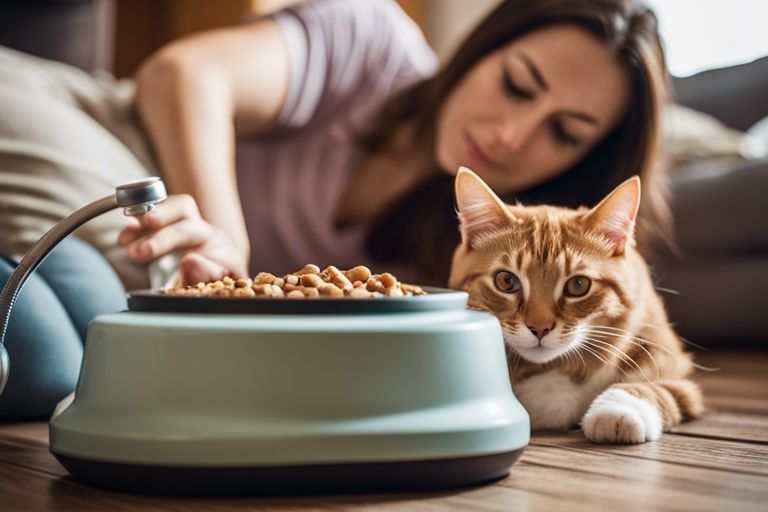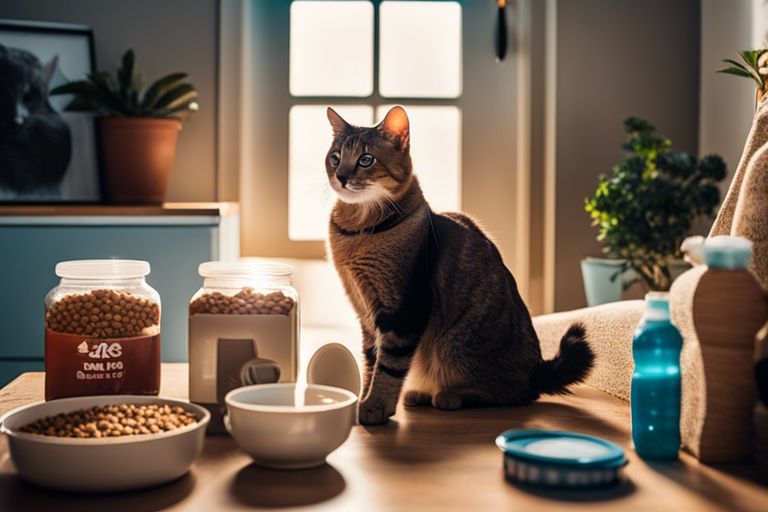Have you noticed that your feline friend’s belly seems larger than usual? In some cases, a bloated belly in cats can be a sign of a serious health issue. It’s important to pay attention to this symptom, as it could indicate a serious medical condition that requires immediate attention from a veterinarian. While there are less concerning reasons for your cat’s bloated belly, such as overeating or gas, it’s essential to be aware of the possible dangers associated with this symptom. In this blog post, we’ll explore the potential causes of a bloated belly in cats and provide guidance on when to seek veterinary care for your furry companion.
Key Takeaways:
- Fluid Retention: A bloated belly in cats could be a sign of fluid retention, often caused by heart or kidney disease.
- Parasites: Intestinal parasites, such as worms, can cause a bloated belly in cats and should be treated promptly.
- Obesity: Overfeeding or lack of exercise can lead to obesity in cats, resulting in a bloated appearance.
- Gastrointestinal Issues: Inflammation or blockages in the digestive system can cause a bloated belly in cats, indicating the need for veterinary intervention.
- Pregnancy: Female cats may have a bloated belly due to pregnancy, which should be confirmed and monitored by a veterinarian.

Common Causes of Bloating in Cats
Obviously, seeing your cat with a bloated belly can be concerning. There are several common causes of bloating in cats, ranging from dietary issues to parasitic infections. Identifying the cause of your cat’s bloating is crucial in determining the appropriate treatment and ensuring your cat’s health and well-being.
Dietary Issues and Food Allergies
When your cat’s diet is not properly balanced or they have a food allergy, it can lead to bloating. Your cat may be consuming food that is difficult for them to digest, leading to gas accumulation in the stomach and intestines. This can result in bloating and discomfort for your cat. Additionally, food allergies can cause inflammation in the digestive tract, leading to bloating and digestive upset. It’s important to carefully review your cat’s diet and consult with your veterinarian to determine if dietary issues or food allergies are contributing to your cat’s bloating.
Parasitic Infections
Parasitic infections, such as roundworms, can lead to bloating in cats. These parasites can take up residence in your cat’s digestive tract, causing inflammation and hindering the normal movement of food and gas through the intestines. This can result in bloating and discomfort for your cat. Additionally, if left untreated, parasitic infections can lead to more serious health issues for your cat. It’s essential to have your cat regularly dewormed and to consult with your veterinarian if you suspect a parasitic infection may be causing your cat’s bloating.
Medical Conditions Leading to a Bloated Belly
Clearly, a bloated belly in your cat is a cause for concern. While there could be various reasons for this, it’s important to understand the medical conditions that could lead to this symptom. Identifying the underlying cause is crucial for your cat’s health and well-being.
Gastrointestinal Diseases
If your cat has a bloated belly, it could be a sign of gastrointestinal diseases such as inflammatory bowel disease, intestinal parasites, or gastrointestinal cancer. These conditions can lead to an accumulation of gas or fluid in your cat’s abdomen, causing the bloating. Additionally, conditions like pancreatitis or liver disease can also contribute to a bloated belly. If you notice persistent bloating in your cat, it’s important to have them evaluated by a veterinarian as soon as possible to rule out these serious gastrointestinal issues.
Organ Diseases and Fluid Accumulation
Organ diseases, such as heart or kidney failure, can lead to fluid accumulation in your cat’s abdomen, resulting in a bloated belly. This fluid buildup is known as ascites and can be a sign of a serious underlying condition. If your cat’s belly appears to be distended and they also display symptoms such as lethargy, difficulty breathing, or loss of appetite, it’s imperative to seek veterinary attention immediately. The presence of ascites could indicate a life-threatening condition that requires immediate medical intervention.
Diagnosis and Treatment
Noticing a bloated belly in your cat can be concerning, but the good news is that veterinary professionals have several diagnostic tools and treatment options to help address the issue. It is important to seek proper diagnosis and treatment as soon as possible to ensure the health and well-being of your feline friend.
Veterinary Diagnostic Approaches
When you bring your cat to the veterinarian for a bloated belly, they will likely perform a thorough physical examination to assess your cat’s overall health. Diagnostic tests such as blood work, urine analysis, and imaging studies like X-rays or ultrasounds may be recommended to identify the underlying cause of the bloating. In some cases, your veterinarian may also recommend a procedure such as abdominal fluid sampling to gather more information about your cat’s condition. Prompt and accurate diagnosis is crucial for determining the most effective treatment plan for your cat.
Treatment Options and Home Care
Once the underlying cause of your cat’s bloated belly has been identified, your veterinarian will present you with treatment options tailored to your cat’s specific condition. This may include medications, dietary changes, or surgical intervention, depending on the underlying cause. It is important to follow your veterinarian’s recommendations closely and administer any prescribed medications as directed. In addition to professional veterinary care, you may also be advised on home care measures to support your cat’s recovery, such as providing a comfortable and stress-free environment. Your active participation in the treatment and care of your cat will greatly contribute to their overall well-being and successful recovery.
Prevention and Long-term Care
To ensure the long-term health and well-being of your cat, it is essential to take preventive measures to address any potential factors that may lead to a bloated belly. Regular health check-ups and proper dietary management are crucial in preventing bloating and abdominal distension in cats. For more information on the symptoms of bloating in cats, you can visit Bloating (Abdominal Distension) in Cats.
Dietary Management and Nutrition
When it comes to preventing bloating in your cat, a well-balanced and appropriate diet is key. Ensure that you are feeding your cat high-quality, easily digestible food that is suitable for their age, size, and activity level. Avoid overfeeding and keep an eye on portion sizes. In addition, make sure your cat has access to fresh water at all times to maintain proper hydration.
Regular Health Check-ups and Preventive Measures
Regular trips to the veterinarian for health check-ups are crucial in preventing and addressing potential health issues in your cat. Your veterinarian can assess your cat’s overall health and provide preventive measures to avoid the development of conditions that may lead to a bloated belly. It is important to stay up to date with vaccinations, parasite control, and any necessary blood work or diagnostic tests as recommended by your veterinarian.
Why does my cat have a bloated belly?
Following this discussion, if you notice that your cat has a bloated belly, it could be due to a variety of reasons such as overeating, gastrointestinal issues, or possible medical conditions. It is important to monitor your cat’s symptoms and behavior and consult with a veterinarian to rule out any serious underlying health issues. Keep an eye on their diet and portion sizes and make sure they are getting enough exercise. Remember, a bloated belly in cats should not be ignored and prompt attention is essential to ensure your feline friend’s well-being.
FAQ
Q: Why does my cat have a bloated belly?
A: There are several potential reasons for a cat to have a bloated belly. It could be due to the accumulation of gas in the digestive system, obesity, fluid retention, pregnancy, intestinal blockage, or underlying health issues such as liver or kidney disease. It’s important to consult with a veterinarian to determine the underlying cause.
Q: What are some symptoms of a bloated belly in a cat?
A: Some common symptoms of a bloated belly in a cat include a visibly enlarged abdomen, discomfort or pain when the belly is touched, loss of appetite, lethargy, vomiting, diarrhea, difficulty breathing, and changes in litter box habits. If you notice any of these symptoms, it’s important to seek veterinary attention promptly.
Q: How can I prevent my cat from developing a bloated belly?
A: To help prevent your cat from developing a bloated belly, it’s important to provide a balanced diet, ensure your cat receives regular exercise, and maintain regular veterinary check-ups. Additionally, it’s important to monitor your cat’s weight and body condition score, as obesity can contribute to a bloated belly. If you have any concerns about your cat’s health or nutrition, consult with a veterinarian for personalized advice.

Jayley, a devoted cat enthusiast, also writer for other cat blog as well. She aims to dedicated to providing comprehensive information, insights, and advice on everything you’d ever want to know about our whiskered companions.
